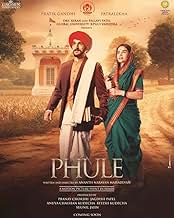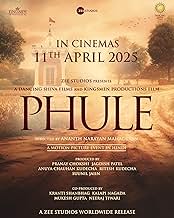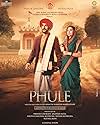Phule
- 2025
- 2h 9min
CALIFICACIÓN DE IMDb
8.1/10
2.4 k
TU CALIFICACIÓN
Una pareja en la época de matrimonios infantiles desafió normas educando a la esposa. Se volvieron reformadores defendiendo derechos de los desfavorecidos.Una pareja en la época de matrimonios infantiles desafió normas educando a la esposa. Se volvieron reformadores defendiendo derechos de los desfavorecidos.Una pareja en la época de matrimonios infantiles desafió normas educando a la esposa. Se volvieron reformadores defendiendo derechos de los desfavorecidos.
- Dirección
- Guionistas
- Elenco
- Dirección
- Guionistas
- Todo el elenco y el equipo
- Producción, taquilla y más en IMDbPro
Opiniones destacadas
Book My Show is doing injustice to the audience by not making the film made on Mahatma Phool available for booking. The film is well made but I am angry with the director because the changes he has made make it seem as if the whole context has changed. But still his effort to make this film is commendable. Thanks to the entire team of Phool for bringing Mahatma Phool on screen once again. Whatever changes were made in this film, it would not have hurt any Brahmin community, but it is not good to change the history of our Mahatma's message to please someone.
But many cinema halls did not show this, which clearly shows how much they are affected by the deeds of their ancestors.
But many cinema halls did not show this, which clearly shows how much they are affected by the deeds of their ancestors.
I just watched Phule and honestly, I'm surprised how so many bad reviews have piled up against it. It doesn't feel organic. Looks like there's a campaign going on.
I went to the theatre pulled by the lure of Pratik Gandhi, Anant Mahadevan, and the legend of Jyotiba Phule. But when I came out, it was Savitribai (Patralekha) who stayed with me the most. What a performance. Strong, tender, fierce - everything Savitribai deserved.
Phule is a beautiful, honest telling of Jyotiba and Savitribai Phule's lives - their struggles, the amount of hate they had to eat just to do something as simple and pure as educating girls and the so-called 'lower castes'. Watching it, you realise how much of the modern, educated India we are proud of, actually rests on the shoulders of these two.
Yeah, I heard some groups forced the makers to tone down a few words. But even then, the message shines through, loud and unapologetic. It's a well-directed, splendidly-acted film. Very real.
The practices, the tensions, the way society was wired back then - I don't think I've seen that period captured this authentically before.
In fact, during the film, my mother kept telling me little things - like how 'shudra shadows' were a real thing, how zamindars thought of themselves as gods.
The theatre was packed for an evening show, and when the movie ended, there was applause. Some guys even started chanting "Jai Phule!" My mother said it delivered its message way better than Chhaava did.
And then there's Pratik Gandhi. Man has a hypnotic presence. There's a scene - a close-up - where Phule looks straight into the camera and says: "India is an emotional country. It's easy to divide us on religion and caste. And this won't stop. People will keep trying." You could hear a pin drop in the hall. It felt like he wasn't just warning people of that time - he was warning us.
Which is why I'm honestly shocked to see some people (like The Wire) call this a 'dull' or 'neutered' biopic. Were we watching the same film?
For me, Phule sits right next to OMG 2 - both using education as a weapon for rediscovering equality.
The film is clever too - it shows how Phule could see through the British agenda of using English education to convert Hindus to Christianity. He understood it, but still used English education to arm the oppressed, to build a better future. He didn't throw the baby out with the bathwater. He was smart about it.
First half went by so fast, my mum asked me, "Interval already?" That's how engaging it was.
More than anything, Phule planted something in me - a want to read more about the Satyashodhak Samaj, about the man who lit the torch that later Babasaheb Ambedkar carried forward.
At a time when students like Rohith Vemula are still being crushed for their caste, when religious extremists are still poisoning minds, when tensions between communities are being deliberately stoked - a film like Phule becomes necessary.
There's a brilliant scene where religious leaders accuse Phule of westernising society, and he simply says - "If your religion can give your children the power to become doctors and engineers, go ahead. Otherwise, let them learn." Chills.
It's a rare feeling when a movie feels like a personal win. For me, Phule did. And I'm glad I watched it.
I went to the theatre pulled by the lure of Pratik Gandhi, Anant Mahadevan, and the legend of Jyotiba Phule. But when I came out, it was Savitribai (Patralekha) who stayed with me the most. What a performance. Strong, tender, fierce - everything Savitribai deserved.
Phule is a beautiful, honest telling of Jyotiba and Savitribai Phule's lives - their struggles, the amount of hate they had to eat just to do something as simple and pure as educating girls and the so-called 'lower castes'. Watching it, you realise how much of the modern, educated India we are proud of, actually rests on the shoulders of these two.
Yeah, I heard some groups forced the makers to tone down a few words. But even then, the message shines through, loud and unapologetic. It's a well-directed, splendidly-acted film. Very real.
The practices, the tensions, the way society was wired back then - I don't think I've seen that period captured this authentically before.
In fact, during the film, my mother kept telling me little things - like how 'shudra shadows' were a real thing, how zamindars thought of themselves as gods.
The theatre was packed for an evening show, and when the movie ended, there was applause. Some guys even started chanting "Jai Phule!" My mother said it delivered its message way better than Chhaava did.
And then there's Pratik Gandhi. Man has a hypnotic presence. There's a scene - a close-up - where Phule looks straight into the camera and says: "India is an emotional country. It's easy to divide us on religion and caste. And this won't stop. People will keep trying." You could hear a pin drop in the hall. It felt like he wasn't just warning people of that time - he was warning us.
Which is why I'm honestly shocked to see some people (like The Wire) call this a 'dull' or 'neutered' biopic. Were we watching the same film?
For me, Phule sits right next to OMG 2 - both using education as a weapon for rediscovering equality.
The film is clever too - it shows how Phule could see through the British agenda of using English education to convert Hindus to Christianity. He understood it, but still used English education to arm the oppressed, to build a better future. He didn't throw the baby out with the bathwater. He was smart about it.
First half went by so fast, my mum asked me, "Interval already?" That's how engaging it was.
More than anything, Phule planted something in me - a want to read more about the Satyashodhak Samaj, about the man who lit the torch that later Babasaheb Ambedkar carried forward.
At a time when students like Rohith Vemula are still being crushed for their caste, when religious extremists are still poisoning minds, when tensions between communities are being deliberately stoked - a film like Phule becomes necessary.
There's a brilliant scene where religious leaders accuse Phule of westernising society, and he simply says - "If your religion can give your children the power to become doctors and engineers, go ahead. Otherwise, let them learn." Chills.
It's a rare feeling when a movie feels like a personal win. For me, Phule did. And I'm glad I watched it.
"Phule" is more than a film-it's a tribute to one of India's most revolutionary social reformers. Jyotirao Phule, along with Savitribai Phule, courageously challenged the deeply entrenched Brahmanical dominance in 19th-century India. At a time when caste oppression and patriarchy ruled every aspect of life, Phule fought for the rights of the oppressed, opened the first school for girls in 1848, and established the Satyashodhak Samaj to promote social equality. He fearlessly questioned the Manusmriti and other religious texts that justified untouchability and gender discrimination. Phule's intellectual fire and moral courage laid the foundation for social justice in modern India. This film does justice to his legacy by bringing his forgotten revolution back to public consciousness. A must-watch for anyone who values truth, equality, and courage."
I just watched Phule and honestly, I'm surprised how so many bad reviews have piled up against it. It doesn't feel organic. Looks like there's a campaign going on.
I just watched Phule and honestly, I'm surprised how so many bad reviews have piled up against it. It doesn't feel organic. Looks like there's a campaign going on.
I went to the theatre pulled by the lure of Pratik Gandhi, Anant Mahadevan, and the legend of Jyotiba Phule. But when I came out, it was Savitribai (Patralekha) who stayed with me the most. What a performance. Strong, tender, fierce - everything Savitribai deserved.
The best best movie in the film industries.
I just watched Phule and honestly, I'm surprised how so many bad reviews have piled up against it. It doesn't feel organic. Looks like there's a campaign going on.
I went to the theatre pulled by the lure of Pratik Gandhi, Anant Mahadevan, and the legend of Jyotiba Phule. But when I came out, it was Savitribai (Patralekha) who stayed with me the most. What a performance. Strong, tender, fierce - everything Savitribai deserved.
The best best movie in the film industries.
Phule is not just a movie - it's an eye-opener. Every woman in India must watch this film to truly understand the harsh reality of where we come from, and what could have been if visionaries like Jyotirao and Savitribai Phule hadn't fought relentlessly for women's education.
The film sheds light on the brutal oppression faced by women, regardless of their caste - even Brahmin women - and how deeply entrenched the system was in denying them the basic right to education. Had Phule not challenged the orthodoxy and dared to fight against the system, the lives of Indian women today could have been drastically different - far worse and far more suppressed.
Phule serves as a stark reminder that rights like education, dignity, and equality were hard-won, not granted easily. It's a warning too - if women today do not stay vigilant and assert their rights, there is always the danger of slipping back into the same dark times, where, under the guise of religion and tradition, women's freedoms could again be curtailed.
The right to life, liberty, and education is not just for men - women must recognise this and fight to protect it. Watch Phule not just as a movie, but as a call to action.
The film sheds light on the brutal oppression faced by women, regardless of their caste - even Brahmin women - and how deeply entrenched the system was in denying them the basic right to education. Had Phule not challenged the orthodoxy and dared to fight against the system, the lives of Indian women today could have been drastically different - far worse and far more suppressed.
Phule serves as a stark reminder that rights like education, dignity, and equality were hard-won, not granted easily. It's a warning too - if women today do not stay vigilant and assert their rights, there is always the danger of slipping back into the same dark times, where, under the guise of religion and tradition, women's freedoms could again be curtailed.
The right to life, liberty, and education is not just for men - women must recognise this and fight to protect it. Watch Phule not just as a movie, but as a call to action.
Selecciones populares
Inicia sesión para calificar y agrega a la lista de videos para obtener recomendaciones personalizadas
- How long is Phule?Con tecnología de Alexa
Detalles
Taquilla
- Total a nivel mundial
- USD 1,454
- Tiempo de ejecución2 horas 9 minutos
- Color
Contribuir a esta página
Sugiere una edición o agrega el contenido que falta


![Ver Trailer [OV]](https://m.media-amazon.com/images/M/MV5BMzdkNWRjMmEtN2Q2NC00MjM0LTljOTQtZGE5OTQ4YzMxYjk1XkEyXkFqcGdeQXRyYW5zY29kZS13b3JrZmxvdw@@._V1_QL75_UX500_CR0)
































